13 January 2003 .
It’s a five-hour trip from Chiang Mai to Tachileik, Burma. Thirty minutes north of town, the road begins a two-hour steep stretch across a low mountain range to the neighboring valley. The road is good. There are even climbing lanes for slow buses like ours. At the top, the earth is red. Giant bamboo grows alongside trees. Tall trunks rooted in the valley floors have canopies meeting us at eye level.
Tucked among the forest trees, occasional orchards, bamboo thatched houses, and resorts suggest the presence of people…somewhere there under the green. Nothing makes us more aware of our lack of education on Asian horticulture and geology. Besides the obvious presence of banana and coconut palms, there is a distinct difference between these forests and the ones back home, but it is difficult to name.
Roadside stands filled with baskets draw us in, but the bus is on its own mission. Lost time is made up on downhill stretches until the range flattens again. Towns appear and vanish, leaving us wondering what adventure we missed there. Endless stretches of tobacco replace the fields that once grew opium poppies. This must be a better option. We wonder
Along a stretch of… not much…the bus stops. One soldier boards while another stands guard at the door. He asks for identification papers. Farangs (Westerners) are ignored with a polite and courteous smile. Those without the right IDs are questioned…more papers are examined. In the English language news, we have read about crackdowns on undocumented aliens and of anticipated increases in drug smuggling. The Burmese poppy crop is in and here we are in the heart of the Golden Triangle. Carol grew up in another Golden Triangle. In name it’s the same, only hers was in southeast Texas and the gold was supposed to be from black crude. There was always talk there, too, about drug smuggling.
Five hours and a free glass of Coke later, the bus pulls into a neat, orderly station. Ever present red songtaos line the sides of the
parking lot. With 3 other farangs, one aggressive bargainer among them, we agree on a trip to immigration for 10 baht each (25 cents). “Such a rip off,“ our indignant companion complains. The usual
price is 5 baht per person. 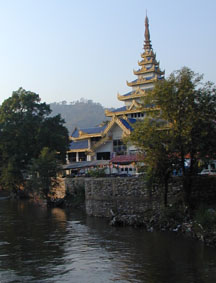
A quick look at our passports and a rubber stamp later, we are out the door and riding on to “downtown” Mae Sai. We decide to drop our small bag at a guesthouse before crossing the border. Our room is clean. Sheets are white with just a few holes (as opposed to gray). With our load lightened, we walk the two blocks back to “main street.”
At the border, Thai officials don’t even look at our passports. Kids run and play along the bridge that separates Thailand from Burma. One young girl with a sly smile holds out her hand and demands 10 baht. Norbert responds with a teasing “Oh, pang mak, mak!” (really expensive!) then makes his own demand of 50 baht from her. She laughs and runs off. Returning again in a minute, the two exchange their terms a second time and laugh together. This time Norbert digs a small handful of Satang out of his pocket and gives them to her. (Satang are small coins of little value. Even Thai vendors prefer to discount the cost of their merchandise rather than hassle with them.) Pleased, she runs off again.
We reach the far side of the bridge. A Burmese official directs us into a small 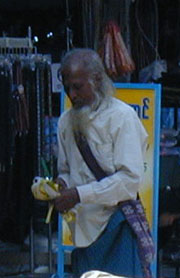 office. Two officers sit at desks. Three young Australian women in
shorts and tank tops are ahead of us. Finally it’s our turn. We hand over both passports. Two five-dollar bills stick out from under the covers looking more like bribes than the required fees.
Another rubberstamp and one officer hands us one-day permits to enter Burma. They expire at 5:30 p.m. and restrict us to this border town. That gives us two hours. He tucks our passports
away in an envelope for safekeeping.
office. Two officers sit at desks. Three young Australian women in
shorts and tank tops are ahead of us. Finally it’s our turn. We hand over both passports. Two five-dollar bills stick out from under the covers looking more like bribes than the required fees.
Another rubberstamp and one officer hands us one-day permits to enter Burma. They expire at 5:30 p.m. and restrict us to this border town. That gives us two hours. He tucks our passports
away in an envelope for safekeeping.
All of Burma certainly isn’t like this small border town, we tell ourselves, no more than Tijuana is the same as all of Mexico, but it makes us wonder. The solid concrete streets of Thailand turn to rubble across the Nam (river) Ruak. It isn’t far from here to the border of China but there is no road yet, we learned. From the top of a rise in the center of Tachileik, we stretch our necks to look north down the road leading out of town. It’s no better there…gravel filled potholes.
The border town market lies to the right and below the bridge.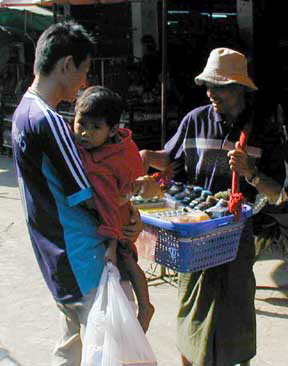 Endless stalls of vendors hawk cheap trinkets that seem to be made in China: key chains, flashlights,
bobble dolls, plastic cups and hair clips. Some carry trays on straps around their necks like hotdog vendors at a football game. “How you like this one?” a woman asks, poking a battery-run plastic mini
-fan into Norbert’s sweaty face. “Give good price!” The faster we walk away, the more aggressive they become. A very old looking woman, bent, with no teeth begs
for spare change. A young boy, maybe 4 or 5, does the same, tugging at our pants and making what looks like a too well rehearsed “pouty” face.
Endless stalls of vendors hawk cheap trinkets that seem to be made in China: key chains, flashlights,
bobble dolls, plastic cups and hair clips. Some carry trays on straps around their necks like hotdog vendors at a football game. “How you like this one?” a woman asks, poking a battery-run plastic mini
-fan into Norbert’s sweaty face. “Give good price!” The faster we walk away, the more aggressive they become. A very old looking woman, bent, with no teeth begs
for spare change. A young boy, maybe 4 or 5, does the same, tugging at our pants and making what looks like a too well rehearsed “pouty” face.
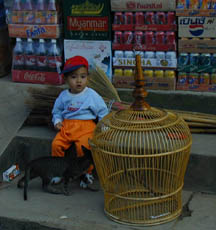
Turning left are more vendors, more beggars, another three or four blocks of them. We duck into a shop that displays fabric. A 50-something year old man who seems to be the owner signals a woman…maybe his wife. She approaches us with perfect English. Could she show us some textiles of Burma? She asks. ”You need not buy anything but I would be happy to show you something of our culture.” It’s a relief. Beautiful hand-woven goods sit in neat stacks on tables. Samples hang along the walls. She explains the differences in quality, where this and that were made. In the end, Carol buys one. The woman had studied at a university in Rangoon. She had been a teacher. Now she keeps her English skills current at this shop on the border.
One man who seems to have cerebral palsy has fingertips rotting away. It looks like something we once saw in a book about leprosy. We put some money in his cup and in a few others realizing how pathetically little it is in the face of all this need. The vendors and beggars finally get the best of us, or maybe it's the sobering poverty that drives us back to main street. This is where locals seem to shop at grain stores and where life seems a little less desperate. A young boy sits on steps near a cage with a cat crawling over him. An old gray bearded man in a sarong stops to talk with a shopkeeper. We want to take more photos but somehow feel like we are intruding here. We belong back in the tourist alleys. After only one brief hour, we feel driven back across the border. Too bad. Maybe next time we will have more persistence or courage or whatever it takes.
Back at the crossing, our passports are returned. Across the bridge at Thai immigration, they’re again stamped giving us another 90 days until our next required journey.
We eat supper on the south bank watching naked Burmese boys play along the 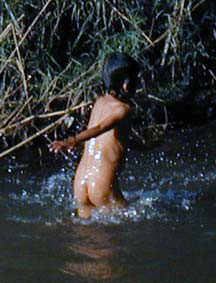 bank and in the muddy river below. One catches a snake or eel
and holds it up proudly. Another catches a big fish with his hands. Burmese women loaded with heavy baskets make their way back home, north across the bridge. The tall
Burmese pagoda, the most notable structure at the border, glows as the sun sets behind the mountains.
bank and in the muddy river below. One catches a snake or eel
and holds it up proudly. Another catches a big fish with his hands. Burmese women loaded with heavy baskets make their way back home, north across the bridge. The tall
Burmese pagoda, the most notable structure at the border, glows as the sun sets behind the mountains.
An evening chill sets in as we walk along the south bank among more reserved Thai vendors, opium pipes and scales for sale among the textiles, jewelry, and Buddha figures. Rubies, sapphires and other cut stones we couldn’t name sit in plastic trays. Gold settings that look “too gold” remind us again of Mexico. Bundles of cigars somehow lack the familiar scent of tobacco.
Our guesthouse blanket is barely enough to warm us. By morning we need our jackets. Mornings start slowly in Mae Sai, but the restaurant across from our lodging seems to be open and promises eggs, hash browns and bacon. That would be a nice change, we think. The waitress doesn’t really understand the English menu so the owner comes to take our order. Pancakes arrive warm and good but with little syrup. Eggs are scrambled as promised. Hash browns are mushy, cold and taste a way only cold grease can taste. The “bacon” was two cold half slices of pressed ham. It’s OK. Hot sauce hides many faults!
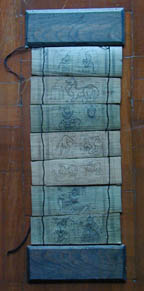 We pack our small bag and try to find some interesting way to spend time until the bus back departs. Several upscale
antique shops look interesting. We give in again and decide to purchase a set of old drawings on bamboo. They are patterns for tattoos along with Pali writing
that promises to ward off evil spirits. Maybe the bamboo patterns will work for us in lieu of actual tattoos. We’ll hang them on the wall.
We pack our small bag and try to find some interesting way to spend time until the bus back departs. Several upscale
antique shops look interesting. We give in again and decide to purchase a set of old drawings on bamboo. They are patterns for tattoos along with Pali writing
that promises to ward off evil spirits. Maybe the bamboo patterns will work for us in lieu of actual tattoos. We’ll hang them on the wall.
A songtaou takes us back to the bus station to eat lunch at a noodle stand and to wait. We finally board our bus and doze. The mountains near the end of the trip are the most interesting anyway. By the time we reach them, we’re refreshed and amazed. What a fantastic country!
Back at the Chiang Mai bus station, we sit in our songtau waiting for our driver to collect enough passengers. It’s 6 p.m. The scene freezes. Everyone stands in humble respect. The national anthem is about to play. Five stray dogs have gathered in front of the terminal. In unison they raise their muzzles as the first note begins to blare from the loud speakers. They howl and they continue to howl, like singers in a performance, until the last note ends. On-lookers snicker and try to to to contain themselves. We’re home again.
We wish you all well until our next newsletter.
On “The Nation News”:
Prime minister Thaksin will travel to Burma to discuss drug issues with Burmese officials. The problem will be eliminated within the next three months.